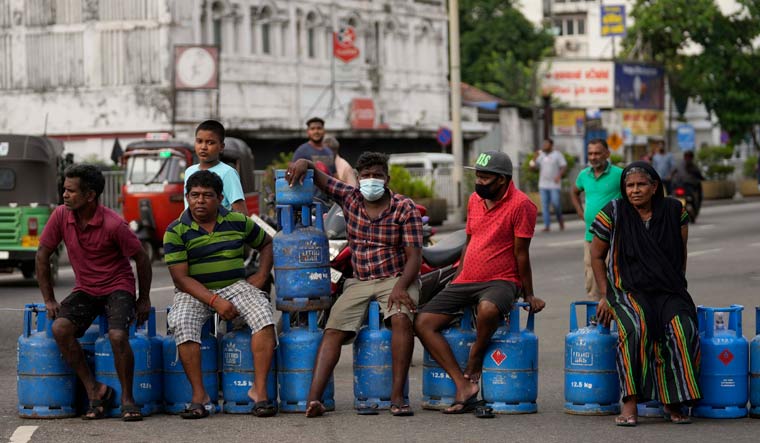Sri Lanka government defends imposition of emergency
Posted on May 7th, 2022
By PTI Courtesy The Week
Govt faces criticism from Oppn parties and foreign envoys
 Sri Lankans block an intersection demanding cooking gas cylinders in Colombo | PTI
Sri Lankans block an intersection demanding cooking gas cylinders in Colombo | PTI
The Sri Lankan government on Saturday defended imposing a state of emergency, saying it was required to tackle the unprecedented economic crisis plaguing the country, even as President Gotabaya Rajapaksa faced flak from the Opposition and foreign envoys for his decision which gives security forces power to crack down on peaceful protests.
In a special Cabinet meeting on Friday, the embattled president declared the state of emergency with effect from Friday midnight. This is the second emergency declared in just over a month.
The announcement came as student activists kept the Parliament under siege since Thursday night.
The students blocked the main entrance to the complex demanding the resignation of the government for its inability to handle the ongoing economic crisis marked by shortages of essentials.
In a statement on Saturday, the Government Information Department said, “Sri Lanka is currently facing the worst economic crisis and political instability ever after Independence due to manifold reasons both short and long-term. The common perception is that several reforms in the sectors of political, economic and social fabric should be carried out in-depth to escape from this grave situation.”
“Priority among them is to manage the shortage of foreign exchange within the shortest possible time and restore the supply of goods and services, the statement added.
The government said discussions are ongoing with the multi-lateral institutions, including the International Monetary Fund, to obtain financial assistance and restructure outstanding debt.
“Political stability and peace in society are two major conditions that are demanded in building confidence and strength to make such programs a success,” the statement said, explaining the need for the emergency.
Sri Lanka is currently in the throes of unprecedented economic turmoil since its independence from Britain in 1948. The crisis is caused in part by a lack of foreign currency, which has meant that the country cannot afford to pay for imports of staple foods and fuel, leading to acute shortages and very high prices.
Thousands of demonstrators have hit the streets across Sri Lanka since April 9, as the government ran out of money for vital imports; prices of essential commodities have skyrocketed and there are acute shortages in fuel, medicines and electricity supply.
Despite mounting pressure, President Gotabaya Rajapaksa and his elder brother and Prime Minister Mahinda Rajapaksa have refused to quit office.
Commenting on the ongoing negotiations, the IMF’s Colombo mission chief Masahiro Nozaki said, “The IMF team will engage with the economic team of Sri Lankan authorities from May 9 to May 23 in a virtual mission and continue discussions on the authorities’ request for an IMF-supported programme.”
According to IMF assessment, Sri Lanka’s debt is unsustainable. Therefore, approval for IMF financing, including through a Rapid Financing Instrument, would require adequate assurances that debt sustainability will be restored.
Last month, the Sri Lankan government said it would temporarily default on USD 35.5 billion in foreign debt as the pandemic and the war in Ukraine made it impossible to make payments to overseas creditors.
The present state of emergency gives the police and the security forces sweeping power to arbitrarily arrest and detain people.
The country’s human rights body, the main lawyers’ body, the Opposition and even some members of the diplomatic community criticised the government for its move.
The Human Rights Commission of Sri Lanka said it was deeply concerned about the promulgation of an emergency. We urge the government to explain to the public the reasons for this proclamation since protests have been largely peaceful and within the ambit of normal police operations, it said in a statement.
We hope that freedom of speech and assembly, the rights associated with arrest and detention as well as other fundamental rights and freedoms will not be affected or derogated from during the period of the emergency, said the statement.
The Bar Association of Sri Lanka (BASL) in a statement issued said it was “gravely concerned” about the declaration of a State of Emergency by the President.